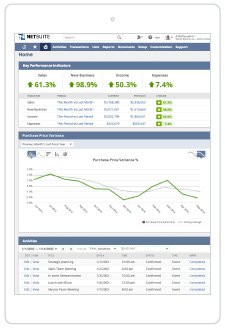CFO
Position your business for adaptability by reducing costs, complexity and risks
Steer Strategically While Managing Risk
Deliver Improved Business Results While Optimizing Financial Processes
Over the years, the CFO role has broadened dramatically, so, today, the position belies the sheer breadth and depth that spans the role. Beyond the core responsibilities of financial reporting, audit and compliance, planning, treasury, and capital structure, CFO’s are, increasingly, playing a more prominent role in corporate portfolio management and capital allocation.
NetSuite enables you to manage your core business processes with a single, fully integrated system while allowing flexibility in a changing business environment saving costs, managing risks, driving productivity and managing compliance—thus allowing you to grow your business.

Benefits
CFO the Leader
Fund, enable and execute on domestic and global expansion strategies and build a financial model to succeed across geographies.
CFO the Strategist
Focus on strategic activities enhancing business performance and shareholder value by delegating critical, yet mundane, finance functions while still maintaining control.
CFO the Steward
Get a more consistent, holistic, real-time view of risks and regulations that could undermine strategic choices. Increase efficiency and maintain a cost-effective organization while keeping pace with fast growing revenue.
CFO the Catalyst
Provide financial perspective on innovation and profitable growth. Enable management and manager’s access to financial information to make effective business decisions.
Features
Scale to Support Growth
Multi-subsidiary enabled, used in 100+ countries across 190+ currencies, 19 languages and tax reporting in 50+ locales.
Optimize Processes to Efficiently Meet Compliance
A single version of the truth across the entire organization offers unprecedented efficiency and accuracy for meeting audit, reporting and compliance requirements.
Lower Total Cost of Ownership
Cloud infrastructure eliminates the need for maintenance of hardware, servers, databases, backups, upgrades and IT infrastructure.
Drive Business Decisions
Built-in, real-time financial dashboards, reporting and analytics to make better, faster decisions.

































